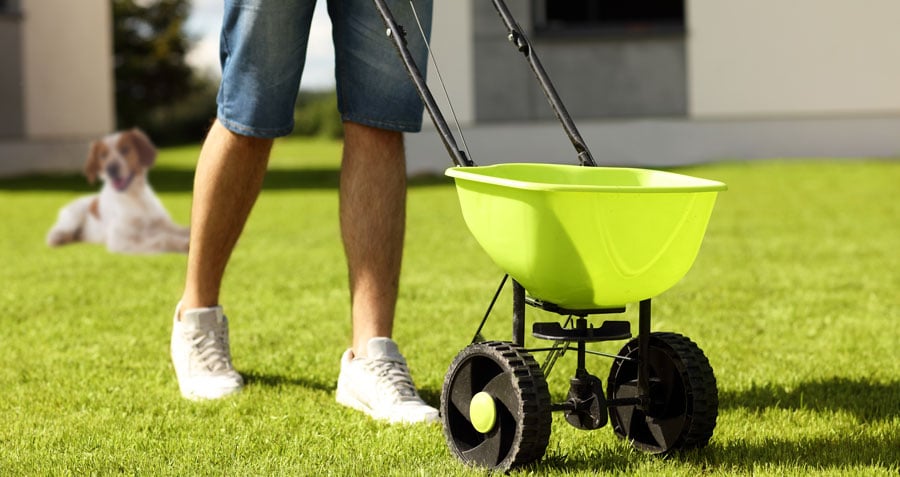It's warming up, and everywhere we look green things are sprouting and growing. It's time to get out the shovel and the garden gloves and spend some time in your yard. It's a fun time of year to be making sure your lawn is the greenest on the block.
But some of the very things that will make your garden grow and make your lawn a luscious green—such as fertilizers, mulch, and insecticides—have the potential to harm your dog, cat or other pets. Do you know what you're putting on your lawn and how it will affect your pet? Here's what you need to know before applying fertilizers and mulch this spring and summer.
Avoiding Lawn and Garden Toxins for Your Dogs
What's in fertilizer, and why is it a potential danger to pets? The good news is that most fertilizers have fairly benign ingredients and should be completely safe 72 hours after application. However, if your dog decides to make a meal of any fertilizer, you could run into some serious issues.
There are two types of fertilizers: granules or water-based. Let's examine the ingredients in both conventional and organic fertilizers, so you know what to purchase and what to watch out for.
What's in Fertilizer?
Fertilizer is a mixture of natural elements—generally non-toxic elements—such as nitrogen, phosphorous, and potash. Some fertilizers contain insecticides.
If your dog or cat were to take a bite of grass shortly after you applied fertilizer, they aren't likely to show any symptoms since the amount of fertilizer ingested would be small. However, if your pup found the bag of fertilizer and decided to have a snack, you may see symptoms such as tremors or seizures. This is why it's important to store your fertilizer somewhere that your dog can't reach and keep your dog off your lawn for 72 hours after application.
Ingredients to Watch Out For
Although the EPA has limited the availability of the truly dangerous fertilizers, there are a few on the market that still have potentially harmful ingredients. Look out for fertilizers with iron in them, as they can lead to iron poisoning, and don't purchase any with insecticides that include carbamates or organophosphates. If your dog ingests fertilizer with carbamates or organophosphates, he or she will exhibit life-threatening symptoms such:
- Vomiting
- Drooling
- Severe lethargy
- Diarrhea or excessive urination
- Abnormal heart rate
- Tremors or seizures
Get your dog to a veterinarian immediately if you believe they've ingested a fertilizer with carbamates or organophosphates.
Organic Fertilizers
It may surprise you to know that organic fertilizers have the potential to be more harmful to your pet—not because of what's in them, but because they're a much bigger temptation for ingestion. Natural fertilizers are often leftover byproducts from meatpacking or farming companies, including bone meal, blood meal, feather meal, and fish meal.
To your dog, organic fertilizers smell delicious and they may prompt your dog to eat a hearty portion. Since these fertilizers aren't meant for ingestion, they can cause gastrointestinal irritation or worse. Some organic fertilizers can congeal internally creating a foreign body obstruction in your dog, while others could cause severe pancreatitis.
If your believe your dog has ingested organic fertilizers, contact us for a thorough examination immediately.
Mulch
Finally, it's important to note the dangers of mulch. Some types smell pleasant, but a common mulch called cocoa mulch can be dangerous to your dog. Cocoa mulch is made from the shells of the cocoa bean and can cause chocolate poisoning. If your dog has ingested cocoa mulch, they will likely exhibit these symptoms:
- Not eating
- Hypersalivation
- Vomiting and diarrhea
- Anxiety and hyperactivity
- Racing heart
- Excessive panting
- Dark red gums
- Tremors and seizures
Contact your vet right away if you suspect your dog or cat has ingested cocoa mulch. As always, if you have any questions or concerns about your pets's health, contact us.
